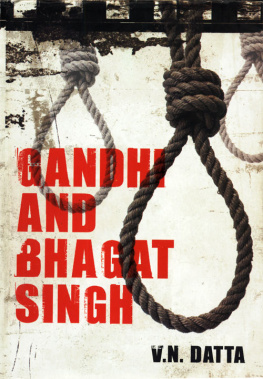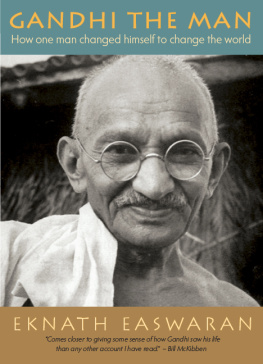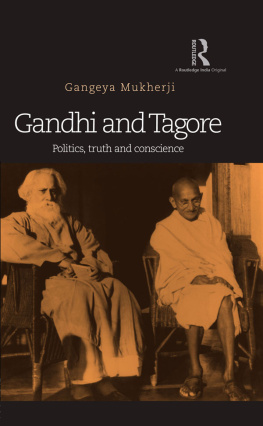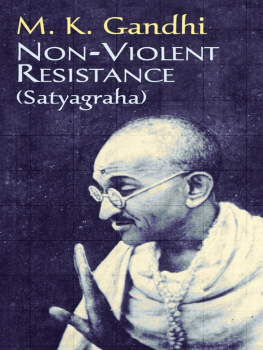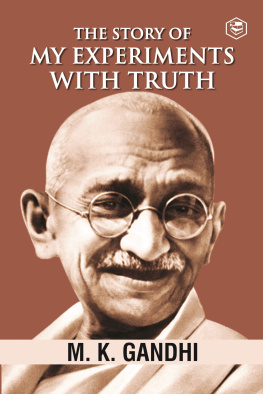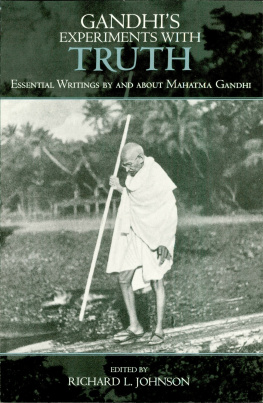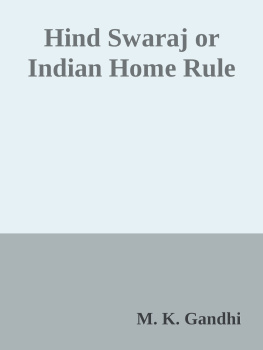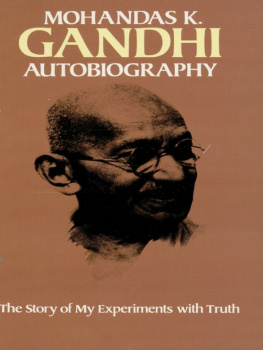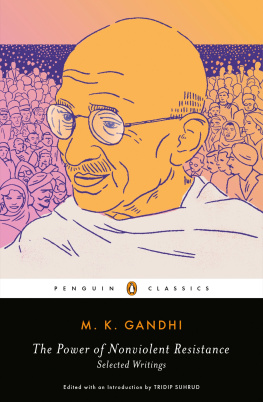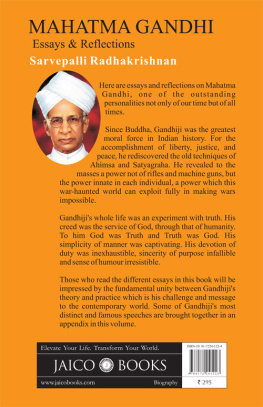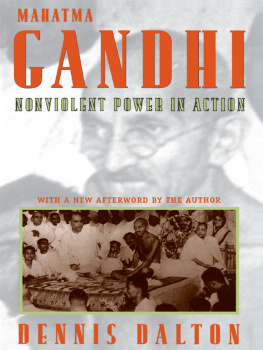Gandhis Passion
GANDHIS PASSION
The Life and Legacy of Mahatma Gandhi
STANLEY WOLPERT


Oxford New York
Auckland Bangkok Buenos Aires
Cape Town Chennai Dar es Salaam Delhi Hong Kong
Istanbul Karachi Kolkata Kuala Lumpur Madrid Melbourne Mexico City
Mumbai Nairobi Sao Paulo Shanghai Singapore
Taipei Tokyo Toronto
and an associated company in Berlin
Copyright 2001 by Stanley Wolpert
First published by Oxford University Press, Inc., 2001
198 Madison Avenue, New York, New York, 10016
First issued as an Oxford University Press paperback, 2002
Oxford is a registered trademark of Oxford University Press
All rights reserved. No part of this publication
may be reproduced, stored in a retrieval system, or transmitted,
in any form or by any means, electronic, mechanical,
photocopying, recording, or otherwise, without the prior
permission of Oxford University Press.
Library of Congress Cataloging-in-Publication Data
Wolpert, Stanley.
Gandhis passion : the life and legacy of Mahatma Gandhi / Stanley Wolpert.
p. cm.
Includes bibliographical references and index.
ISBN 0-19-513060-X (cloth) ISBN 0-19-515634-X (pbk.)
1. Gandhi, Mahatma, 1869-1948.
2. StatesmenIndiaBiography.
3. NationalistsIndiaBiography.
DS481.G3 W64 2001 954.035092dc21
[B] 00-045298
3 5 7 9 8 6 4 2
Printed in the United States of America
on acid-free paper
for
John Kenneth Galbraith
who has so generously shared
his love of India, his friendship
and his wisdom
PREFACE
F OR MORE THAN half a century, from the day I first set foot on Indian soil, February 12, 1948, the day one-seventh of Mahatma Gandhis ashes were immersed in waters off Bombay, I have been fascinated by the remarkable life and tragic death of the man Indians call Great Soul (Mahatma) and Little Father (Bapu).
Stepping ashore at Bombays bustling gateway to India I found myself surrounded by more people than I had ever seen, millions of white-clad mourners headed to Chowpatty beach, where a glistening white ship bore the urn filled with a portion of Gandhis remains. As that bright vessel weighed anchor, thousands waded after it in the bay, hoping to touch the Mahatmas ashes before they were swallowed by the sea.
At that time I knew no more about Gandhi than that he was called the Father of India yet had been murdered by an Indian of his own Hindu faith. The many questions raised by what I saw and heard that day changed the course of my life from marine engineering to Indian history. A decade later, when I began teaching at UCLA, I wrote my first book about Gandhi, a fictionalized story of his assassination, published as Nine Hours to Rama.
Over the next four decades I periodically considered writing the history of Gandhis life and his leadership of the Indian National Congress. After a year or two of trying in vain to plumb the ocean of Gandhiana with its conflicting currents, however, I returned enthusiastically to teaching, opting to tackle other subjects and less enigmatic lives. Though invariably daunted by Gandhis elusive personality and the extent of his archive, I kept hoping that greater maturity and deeper knowledge of India would help me to understand the Mahatmas mentality and reasons for his often contradictory behavior.
After completing my India, A New History of India, Morley and India, Jinnah of Pakistan, Zulfi Bhutto of Pakistan, and Nehru: A Tryst with Destiny, I decided it was time to return to the challenge of Gandhi. That was five years ago, when all ninety volumes of The Collected Works of Mahatma Gandhi had been published by Navajivan Press, in Ahmedabad, where Gandhi had founded his first Indian ashram. On my first visit to the famous Satyagraha Ashram, fewer than five volumes of his letters and papers were in print, though all letters written by or to him were then being indexed and filed chronologically by his disciples.
The daily diaries and biographical works of Gandhis faithful secretaries, Mahadev Desai and Pyarelal Nayar, were by then also in print, as was D. G. Tendulkars exhaustive eight-volume chronicle, entitled Mahatma. After Mahadevs early death, Pyarelal took up his task and published two massive volumes called Mahatma Gandhi: The Last Phase. He was still working on another two, called Mahatma Gandhi: The First Phase, when he died. Pyarelals sister, Dr. Sushila Nayar, one of Gandhis most intimate disciples, completed her brothers labors the year I dined at her home in Delhi four years ago. I almost decided then to abandon my Gandhi once again, feeling that perhaps I had nothing new to add to what was known about the amazing man who called his life an open book, and fearing that at age sixty-eight, completing my research and writing might take longer than my lifetime.
Then, on May 11, 1998, I flew into Delhi to speak at Indias International Center and learned that India had just exploded three underground nuclear bombs in Pokhran. A few days later Prime Minister Vajpayee announced, following several further successful explosions, that India had a very big bomb and was a nuclear weapons State.
I resolved that May to write my book on the life and legacy of Mahatma Gandhi. I am deeply indebted to many wise friends for sharing their memoirs of and insights into the life of Gandhi with me. My Sanskrit guru and friend, Professor W. Norman Brown, was the first of my teachers to tell me how singularly wise a man Gandhi was. A few years later, when I returned to India in 1957, I was privileged to meet and walk with Mahatma Gandhis foremost follower, Vinoba Bhave. Our neighbors in Poona, Rao Sahib and Pama Patwardhan, were close friends of Vinoba and thanks to them, my wife and I were welcomed to join Vinobas entourage during his Gramdan (Gift of Village) pilgrimage of Southern Maharashtra State on December 23, 1957, my thirtieth birthday. I vividly recall Vinobajis unadorned frail body and totally unaffected, unpretentious spirit as well as the brilliance of his mind, and I have always felt that meeting and listening to him was as close as I ever came to meeting Gandhi himself. The Patwardhan brothers often reminisced about Gandhi in our nightly conversations and helped dispel some of the myths and much of the mystery that still shrouds his memory. Jaya Prakash (JP) Narayan, another good friend of Rao Sahib and Achyut Patwardhan, volunteered to join Vinobas Jivandani (Gift of Life) movement while I was still in India, and I also met him as well as his good wife, who had long been an intimate disciple of Mahatma Gandhi.
Dr. Sushila Nayar, the only other lifelong follower of Mahatma Gandhi with whom I met in Delhi in 1996, thanks to our mutual friend and Gandhian disciple, D. C. Jha, was much like Vinoba Bhave, totally devoid of pretense, her mind as sharp in its memory of her greatest patient as was her tongue in its defense of his unblemished character. Madame Vijaya Lakshmi (Nan) Pandit, with whom I enjoyed several teas during the last decade of her life, in New Delhi, once told me that Mahatma Gandhis influence for the good in her life was as great as her adored older brother Jawaharlal Nehrus influence had been. I never met any of Gandhis sons, but I have recently had the pleasure of speaking at some length with Mahatma Gandhis two most brilliant grandsons, Dr. Rajmohan Gandhi, whose
Next page

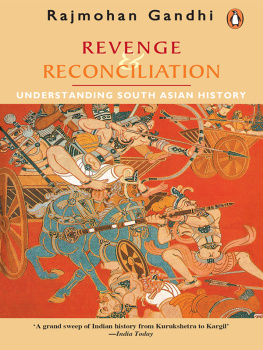
![Gandhi - Gandhi: [the true man behind modern India]](/uploads/posts/book/175484/thumbs/gandhi-gandhi-the-true-man-behind-modern-india.jpg)
